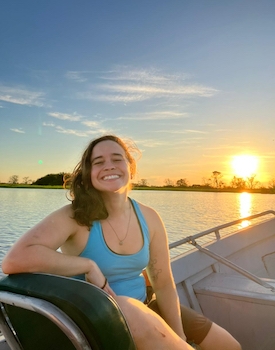Priscila dos Reis Cunha
IGC FELLOW | Global Change Center
Ph.D. Student • Fish and Wildlife Conservation
Advisors : Dr. Leandro Castello
Research Interests: Socio-ecological systems; natural resource use; indigenous and traditional communities; biodiversity conservation
prisrcunha@vt.edu

Priscila dos Reis Cunha is a PhD student at the Fish and Wildlife Conservation department at Virginia Tech. She has long been interested in the human aspects of biodiversity conservation, especially among small-scale communities. For that reason, she has researched coupled natural and human systems in the Brazilian Amazon over the last seven years.
Priscila has a Bachelor's and Teaching degree in Biology from the University of Sao Paulo (USP), Brazil. During her undergrad, she studied the functional response of predation in polyps of Chrysaora plocamia (Scyphozoa: Cnidaria). Priscila also holds a Master’s degree in Science by the Complex Systems Modeling program at USP, for which she examined the effects of a conditional cash transfer program on agriculture deforestation in a remote indigenous community in the Brazilian Amazon. The thesis findings resulted in two articles, which allowed us to better comprehend the possible ecological effects of social public policies and how human behavior can influence these effects.
After her Masters, Priscila worked at the Getulio Vargas Foundation Business and Human Rights Research Center, in Sao Paulo (Brazil), where she developed socio-ecological research to base public policy propositions on the Brazilian Amazon. Among the topics studied were the decision-making process of major infrastructure projects, the social-environmental impacts of these enterprises, and the legislative decision-making on Downsizing, Downgrading, and Degazettement of Brazilian Protected Areas.
In her PhD program, Priscila will be working with Dr. Leandro Castello to understand how natural resource use and, more specifically, how fishing and co-management activities affect and are affected by environmental characteristics and human behavior. For that, she intends to analyze what ecological factors may influence the success of co-managed fisheries. First, she will look at the success of the community-based management of Arapaima, using data collected in the field. Then, she aims to compare these findings with other fisheries around the world through metanalysis. Priscila also intends to analyze the ecological effects of different fishing regulations in the Amazon and the consequences of these ecological effects on food security using fishers' knowledge data. She hopes this integrated view will provide novel insights regarding a holistic approach to comprehending social-ecological systems and natural resource use, which may improve co-management settings and enhance their capacity to protect the freshwater ecosystem.






